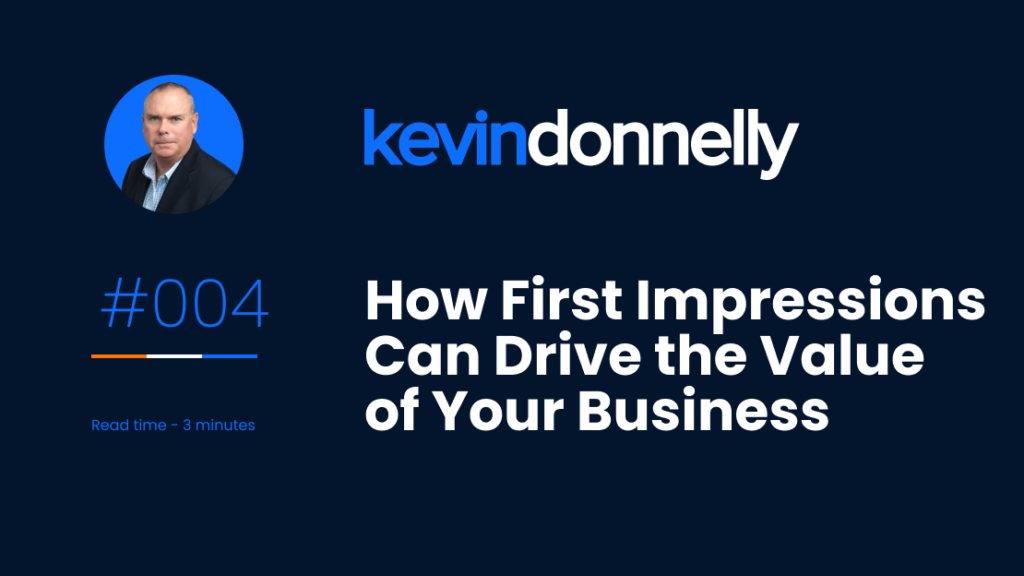Are you ready to meet your next level? Click here to book your free discovery call

The initial impression customers have of your business often influences how much they decide to spend with your company. This is well known, but have you ever considered how first impressions affect the way potential investors value your business?
When raising capital, investors’ initial perception of your business significantly impacts their valuation, affecting both the equity you’ll need to give up for growth and the company’s value when selling.
Take Jeremy Parker’s experience raising money for Swag.com as an example. Investors initially perceived Swag.com as a simple distributor of promotional products. Despite Parker’s efforts to position the company as more than a middleman, investors weren’t convinced. They categorized Swag.com with other promotional product companies, offering Parker a low single-digit multiple of EBITDA for a stake in his business.
Parker re-strategized, presenting Swag.com as an e-commerce platform with a memorable domain name and a world-class, elegant, direct-to-consumer buying experience. This shift in perception transformed Swag.com from a simple distributor to a technology company in investors’ eyes. As a result, Parker received an acquisition offer that valued his $30 million company at a healthy multiple of revenue.
When it comes to raising funds or selling your business, optics matter significantly, and the way investors categorize your business in their minds plays a crucial role.
The Alibaba Discount: Why Diversification Can Hurt Your Valuation
Speaking of being categorized incorrectly inside the minds of investors, recently Chinese Internet giant Alibaba announced its intention to split into six separate businesses. In the two weeks following the announcement, Alibaba’s market value increased by $19 billion. Why would investors welcome such a move? Alibaba consists of a range of businesses resembling those of Amazon.com, including e-commerce, logistics, and cloud storage. Before the announcement, Alibaba was valued at just ten times their earnings forecast for next year, yet each individual business as a standalone will likely fetch a much higher multiple.
Investors often discount businesses like Alibaba, as they are compelled to purchase assets they may not be interested in. They frequently apply the lowest value multiple of a particular business to the entire group of companies. Amazon faces a similar situation. The Bloomberg Intelligence Unit estimates that Amazon’s cloud storage division, AWS, could be valued at $2–3 trillion as a standalone business. However, as a collection of various services, from e-commerce to audiobooks and cloud storage, Amazon’s entire market capitalization is less than half (around $1 trillion) of what Bloomberg analysts believe just one of its divisions could be worth as a standalone.
Focus or Diversify? Striking a Balance Between Revenue and Valuation Goals
Investors typically prefer businesses that concentrate on dominating a single product or service rather than diversifying into various unrelated offerings. A diversified portfolio may lead investors to perceive your business as unfocused, which can result in a lower valuation. The same principle applies when you decide to sell your company. If your business appears scattered, potential acquirers may focus on your least valuable division and apply that multiple to your entire organization.
It’s essential to prioritize your goals: Do you aim to grow your business by increasing revenue or enhancing its value? While these objectives are related, they require different strategies. Pursue diversification if your primary goal is to boost revenue. However, if you’re striving for a more valuable company that could potentially be sold, maintaining a clear focus is crucial.
When you're ready here's 3 ways I can help You Build Value For Your Company.
1. Let me work with you on your hiring.
If you're having trouble finding and keeping the right people to help grow your business I can show you what I did to go from 80 to 600 over a couple of years. Check out our free hiring assessment quiz...
2. Let's talk about what your business could be worth.
If you're like a lot of people thinking about what their end game is and want to know what your business is worth now and what it could be worth. Take my FREE Value Assessment and then we can talk.
3. Work With Me 1:1
If you'd like to work directly with me to increase the value of your company and establish your End Game plan, book a time to talk.
Similar Posts

Kevin Donnelly
December 28, 2024
TAM vs. Target
As you enter the fourth quarter of the year, you may be starting to think about your marketing plans for 2023. Terms like Total Addressable Market (TAM) and Target Market...

Kevin Donnelly
December 21, 2024
Ownership Has Its Privileges
Walk down Nashville’s Lower Broadway any night of the week, and you can hear aspiring artists belting out cover tunes from Elton John to Garth Brooks. In many cases, these...

Kevin Donnelly
December 14, 2024
Do Not Poke the Giant
On June 1, 2011, both Floyd’s Coffee Shops in Portland, Oregon were busier than usual. The regulars were elbowed out of the way by new customers visiting the store for...
